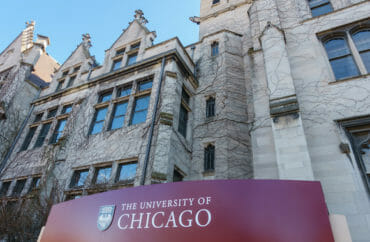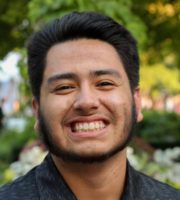
UPDATED
A spokesperson for the University of Chicago has defended the right of a professor of law to use the n-word in his class, done to instruct students on the “fighting words” exception to the First Amendment, after its use drew backlash and a call for possible sanctions.
Law Professor Geoffrey Stone, a prominent advocate of free speech, recently came under fire for using the slur as part of an instructional tool in his “Constitutional Law II: Freedom of Speech” class, which he has taught for decades. He has also used the anecdote for decades.
When asked to weigh in on the controversy, Jeremy Manier, assistant vice president of communications, told The College Fix on Tuesday that professors have the right to teach how they see fit — and students are free to complain about those pedagogical choices as well.
“Faculty members have broad freedom in the choice of ideas to discuss in the classroom and in their expression of those ideas, and students are free to express their views on those subjects,” he said via email.
“The University of Chicago is deeply committed to the values of academic freedom and the free expression of ideas, and to fostering a diverse and inclusive climate on campus. We believe universities have an important role as places where controversial ideas can be proposed, tested, and debated by faculty and students,” Manier said.
Stone has written two books on free speech and is perhaps best known for having chaired a committee for the university several years ago that helped to establish the institution’s sweeping “Stone report,” which affirmed its zero-tolerance policy on restricting speech.
At issue is Stone’s longtime tradition of telling an anecdote in class to teach about the modern relevance of the “fighting words” exemption to the First Amendment, that being words that seek to incite the infliction of injury or immediate violence, as established in Chaplinsky v. State of New Hampshire.
“Campus censors frequently cite [the fighting words exemption] to legally justify policies that prohibit offensive or indecent language, even though subsequent case law has effectively invalidated this portion of Chaplinsky’s holding,” according to the Foundation for Individual Rights in Education, a free speech advocacy group.
This does not mean that the “fighting words doctrine” is no longer a subject for debate, as it was employed as recently as 2011 by Supreme Court Justice Samuel Alito, who utilized it in his dissent against the legality of the Westboro Baptist Church’s inflammatory speech.
Meanwhile, on Tuesday, the student paper, The Chicago Maroon, published an op-ed from a student in the class that called on Stone “to apologize for what he has said, and reform his pedagogy.”
“I also urge the leadership of the Law School to immediately issue a statement that A) explicitly states what our values are, B) explicitly commits to revoking Professor Stone’s teaching privileges if he continues to speak the N-word inside or outside the classroom, and C) explicitly provides timelines for when it will complete all of the diversity committee’s recommendations,” wrote David Raban, a law school student who is dually enrolled in the University of Chicago’s Harris School of Public Policy as well.
Raban wrote that the anecdote went as follows:
“Professor Stone had asked a Mr. Green (‘who happened to be Black’) what he thought of the fighting words doctrine. Mr. Green had said that he felt the doctrine was no longer relevant. The professor then had asked a white student in an adjacent row what he thought of Green’s argument. The white student had said, ‘That’s the dumbest argument I’ve ever heard, you stupid [N-word].’ Green had then immediately lunged forward, attempting to choke the white student.”
“Upon finishing his story, the professor flashed a grin as he saw many of our shocked faces,” Raban continued. “ … But a professor doesn’t have to use the actual N-word to explain to students why that word could incite violence. We already get it. And any point he tried to make was completely obscured because both his story and act of retelling it were racist.”
The incident also personally impacted Raban’s academic performance, who found that he began to have “trouble focusing and participating in [the] class.”
Initially when asked for a comment, Professor Stone stood firm.
“I have been using the story, which is true, for several decades,” he told The College Fix via email. “The point of the story is not to offend or insult anyone, but to illustrate the distinctive ugliness and power of that particular word and to demonstrate that if the fighting words doctrine has any continuing logic, it is with respect to the use of that uniquely hateful epithet. In a course on the First Amendment, it is essential to identify and to confront the very speech that defines the limits of free expression.”
He reconsidered his decision, however, and decided to cut the anecdote after meeting with students on Wednesday.
“I had a very thoughtful conversation with a group of African American students yesterday and they gave me a much clearer sense of how hurtful, upsetting, and distracting they find the use of this word even when it is not used in a manner meant to be insulting or demeaning,” he told the Hyde Park Herald. “I was very impressed by the depth of their feelings and reactions, and decided that, with that insight, I wouldn’t use the anecdote in class going forward. In the end, I decide that the benefit of using the story is outweighed by the costs of doing so.”
Editor’s note: The headline has been amended to better reflect the body of the story. The story has also been updated to note Professor Stone has changed his mind about telling the anecdote.
MORE: White university dean skewered for using N-word in context; blames Trump
IMAGE: Shutterstock
Like The College Fix on Facebook / Follow us on Twitter






Please join the conversation about our stories on Facebook, Twitter, Instagram, Reddit, MeWe, Rumble, Gab, Minds and Gettr.